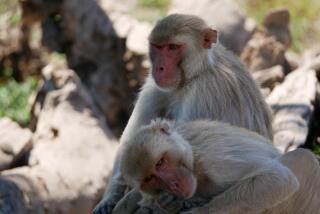A sense of fair play is only human, researchers find
A sense of fair play is uniquely human and is shaped not only by social forces but by heredity, according to a new study involving chimps and a separate study testing human identical twins.
In a food-sharing experiment published today in the journal Science, chimpanzees readily accepted stingy offers humans would tend to reject, suggesting that the human sense of fairness evolved to foster cooperation in a complex society made up of unrelated individuals and groups.
“In the context of everyday life, it is an advantage to not allow people to treat you unfairly. If you do, they will roll over you,” said twin-study lead author Bjorn Wallace of the Stockholm School of Economics.
The chimp study, conducted by researchers at the Max Planck Institute for Evolutionary Anthropology in Leipzig, Germany, used an “ultimatum game,” a classic test to explore fairness.
A typical game is played by two people. One is told to divide a small amount of money between them. If the second player accepts the offer, the money is shared. But if the second player rejects the proposal because it is not generous enough, the players get nothing.
In general, offers that give the second player less than 20% of the money are rejected, giving the first player a strong incentive to be fair.
Researchers modified the game for chimps, using raisins as a reward. Two chimps were separated behind a wire mesh through which they could view two trays holding a total of 10 raisins divided in different ways.
The first chimp offered one of the trays to the second chimp by using a rope to pull the tray almost within reach. If the second chimp accepted the offer, it pulled a rod to bring the tray close enough for both chimps to grab the raisins. If the second chimp refused to pull the tray, neither chimp got raisins.
The experiment was repeated with two trays containing varying combinations of raisins.
In contrast with humans in previous studies, the chimps tended to accept any offer and didn’t get upset when they were offered a small amount of raisins or none at all.
Lead author Keith Jensen said the chimps behaved more rationally than people, because “it makes perfect economic sense to accept any nonzero offer and to offer the smallest amount possible while keeping the most for yourself.”
Human sensitivity to fairness may have evolved along with empathy and other traits that allow individuals to cooperate, Jensen said. Groups of cooperative individuals would have competitive advantages over groups whose members didn’t cooperate, he said. To get along, people need to have some degree of concern for others.
Jensen added, though, that the origins of fairness “are very speculative and debatable.”
Ohio State University psychologist Sarah Boysen, who studies animal behavior, warned against over-interpreting the results. Chimps have a strong sense of justice, she said; it is just not the same as humans’.
“Deviations from their code of conduct are dealt with swiftly and succinctly, and then everybody moves on,” said Boysen, who was not involved with the study. “They’re more adaptive than we are -- just look at the Middle East.”
In the second study, published Tuesday in the Proceedings of the National Academy of Sciences, researchers from Sweden and the United States showed that identical twins were more likely to use the same strategy in the ultimatum game, suggesting that our sense of fairness is partly shaped by genetics.
Researchers proposed 11 ways to divide $15 and asked 71 pairs of fraternal twins and 258 pairs of identical twins to record which offers they would accept or reject. Offers ranged from the entire amount to nothing.
Because identical twins share all the same genes but fraternal twins do not, the study is thought to detect genetic influences in how participants played the game while controlling for some environmental factors, such as upbringing.
Researchers looked at each set of twins to see how closely their rejection decisions matched. They found there was no correlation among fraternal twins but a 42% likelihood that identical twins would make the same choices.
The results mean that many personal economic choices, such as whether to save money or spend it, may be substantially heritable, said Wallace, who conducted the research with colleagues from Sweden’s Karolinska Institutet and MIT.
However, environmental factors were still important, and relationships not shared by the twins, such as friends and jobs, had a greater influence on decisions than genetics in the study, Wallace said.
--




